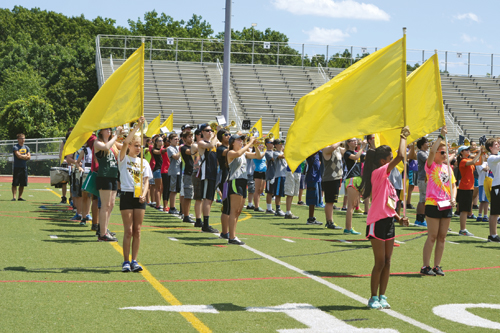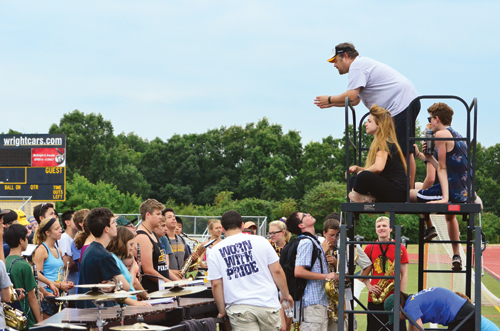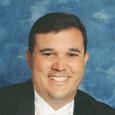
It is not everyday when the local professional sports team wins the championship, but when the Pittsburgh Penguins won the Stanley Cup in 2009 and 2016, Todd Stefan was there and was asked to lead the North Allegheny High School Band in both celebration parades through downtown Pittsburgh. While band students at North Allegheny can tout the numerous accolades their program has received over the years, getting to this point was a very difficult journey both personally and professionally. “This is my 20th year teaching and my 14th at North Allegheny. Before I took this position, I was the band director for a small school district. When the position at North Allegheny opened I expressed interest, and once word of this got around, I was questioned by friends and colleagues, as the program had gone through several transitions in a short period of time. Against their advice, I took the position.”
The North Allegheny, Pennsylvania school district begins instrumental music in the fourth grade and consists of seven elementary schools, three middle schools, a ninth and tenth grade center, and a senior high campus with students in grades 11 and 12. Each year, the North Allegheny senior class averages between 600 and 700 graduates. To achieve cohesion with such a larger program, communication is key. Because the demographics of the North Allegheny district are highly diverse, the high school program receives students from every walk of life. In many respects, Todd Stefan credits this diversity to some of the successes of his band program. “Like most programs throughout the country, many of our students are involved in other activities. In fact my lead tenor saxophone player in the top jazz band is also a starting defensive lineman on the varsity football team. Our recruiting mechanism is fairly consistent and we have similar problems as most directors. Some years recruiting is up and other years it is down. Some of this fluctuation is within our control and other times it is as simple as whether one of the popular students decides to continue in band.”
In such a large school district, how do you and the instrumental staff stay on the same page?
In the North Allegheny school district, schedules make it nearly impossible for all of the directors to travel between schools. My associate and I mostly work between the Intermediate School (9th-10th grade center) and the Senior High School (11th-12th grade center). I conduct the three concert bands at the Senior High in addition to the top and fourth jazz bands. My associate leads the second and third jazz bands. At the Intermediate School, my associate and I share similar responsibilities with the concert groups on that campus. We both work with the marching band, and because of our constant interaction throughout the day we are able to stay on the same page fairly easily. The other directors in the school district have schedules that rarely line up with ours, so we rely on frequent communication through email and talking at in-service meetings and PMEA events. We have a great team that really works well together, and everyone understands what is necessary to move the students from one level to the next within the school district.
What are some events that get younger students excited about being in the high school band program?
My associate director and I are fortunate that the principal and central office administration understand and support the band program. One of the concessions we are allowed is meeting with every eighth-grade band student one on one. During this meeting we have a conversation and administer a playing test that allows us to get an idea on placement in the high school program. This meeting offers several benefits, including creating balanced instrumentation at the high school, identifying what should be addressed fundamentally between eighth and ninth grade, and easing some of the anxiety students face in the transition to high school. Additionally, our administration allows our current 9th, 10th, and 11th grade students visit their middle school band program to talk to the upcoming students about their experiences at the high school. We typically bring food. My students give a presentation covering all aspects of the high school program, including the trips we take and anything else that we feel the upcoming students will resonate with. I find that our student presenters take pride not only in their presentation, but also in the contribution they are making to the future of the band program.
We have two major program-wide events, one in the fall and one in the spring. In fall we invite all three middle schools to participate in a football game with the marching band. Prior to going in to the stadium area, the eighth-grade students march over to the stadium with our band members. We are fortunate to have a long straight pathway on our route that takes us from the band hall, through the tailgaters and to the stadium.
On the field, the eighth graders are positioned in front of the high school students. They will perform the school song, fight song, alma mater, and the national anthem. We have the middle school band directors conduct on the field to show the students that there is no disconnect between these two parts of the North Allegheny band program. Having the middle school directors on the field calms some of students’ initial anxiety and provides extra eyes and ears to assist with the massed band. Once pregame is over, we invite them into the stands and purposely have our students intermingle with the eighth graders. We want to give the eighth graders a great experience by talking to the high school students and experiencing the fun that marching band creates. During halftime, we invite the eighth graders to the field to watch both our show and the visiting high school band’s show. It is a great experience for the eighth graders, and our current high school students get a kick out of being the mentors, so to speak.
During the spring semester we have an event called the All NA (North Allegheny) Band Night. The event, also known the ExtraviBanza, allows the elementary teachers to pick their best players and make a band from all seven elementary schools in the district. The truth is that almost every elementary band student participates, and this is a great thing for us as it excites the students and gets the parents involved in a district-wide event. We also have a single band formed from the three middle schools. During the event my associate will have the intermediate high school wind ensemble perform as a showcase group. We use this group as it will resonate with the middle school students more than the top 11th- and 12th-grade wind band. The message we send to these students is “This is what you can look forward to next year versus two years away.” During the transitions between performing groups the top jazz band will perform to keep the crowd entertained. We conclude with one massed band of all students in grades five through twelve as a fun way to end the event.

Considering how large your music program is at North Allegheny, what roles do parents play?
I have a tremendous parent organization (The North Allegheny District Band Patrons) that takes care of a ton of administrative tasks as they relate mostly to travel and fundraising. The band parents will do all the typical things most high school programs rely on, including uniform fittings, alterations, and tasks that are special to such events as trips. In addition to this, my parents will also assist with grant writing and take the lead on all aspects of fundraising, including meeting with the principal and other interested school officials. With parental support, I am able to focus most of my time on improving the band’s performance with increased attention to detail of my teaching.
The parent organization includes a head chaperone position and an assistant head chaperone position. Each has certain responsibilities linked to it, with the head chaperone position coordinating most of the activities. My rationale behind having two head chaperone positions is to have these parents coordinate and execute the necessary activities on trips that ensure student safety. Their focus is to coordinate and communicate with the other parents while my focus remains on the music and the students’ learning. Our parent volunteers must go through extensive background checks to be involved with the students. The amount of paperwork and follow up is tremendous, and having a parent leader in the organization I can rely on really allows my focus to be where it should.
For the director who has to build a booster group from the ground up, or assist in reorganizing, what advice would you give to get this started?
My advice for any director, whether starting a new band booster organization or organizing an existing one, is to find a parent in line with your philosophy to be the president. Once this happens, that person can then form committees and recruit parents who would best serve in those positions. Once the culture is defined and the president position is established, I would suggest that the band director monitor the group’s progress as necessary. Following this philosophy, I am fortunate to have a president who will come to me prior to going to other parents when wanting to stray from the norm, even if the intentions are good. Once this culture is present, the booster organization can become a huge asset rather than a drain on the director’s time.
Describe a typical warmup you like to use with your ensembles.
A normal concert band rehearsal is 42 minutes each day. What I found works best is to give students the first five or six minutes to get the equipment and materials out and warm up on their own. I encourage the students to work on scales, technical passages, and other materials to get ready for the rehearsal. Once this time has passed, I will generally spend about five to seven minutes working on breathing, articulation, long tones, chorales, and singing.
I began to shift my focus to working on sound production versus technique, as I had adjudicators tell me that while my concert bands play technically well, the overall sound was similar to a marching band. While I am no advocate of a marching band sound versus a concert band sound, I decided to find ways to create a warmer and more inviting sound. I do this in all of my ensembles, including the marching band. To me the difference is not in the quality of sound, but rather I may have 30 trumpets in the marching band versus the eight I have in my top concert ensemble. There is a difference, but I think the concept of developing the desirable sound should the approached in the same manner with any ensemble.
How would you advise a younger band director to develop a band’s sound?
During band camp, which is the two weeks before school starts, I will begin teaching the concepts of breathing and sound production that we will carry over to concert band. Once school starts, in rehearsals I focus on having students develop their overall sound by focusing on intonation and listening to recordings. I am a huge advocate of Mayhew Lake’s arrangement of 16 Chorales for Band (J. S. Bach). I have found that these chorales are a staple for getting students to understand how to balance chords and how to adjust, especially the third of the chord in both major and minor keys. Going back to establishing the culture, I find it is beneficial for the students to sing, as well as play, these chorales as it helps the students focus their ears in a different manner. I found it difficult at first to get band students to sing, but once they were able to hear the difference in their sound, especially their overall intonation, the culture developed and now it is simply a part of our everyday rehearsal. In addition to the Bach chorales, we will use Leonard Smith’s Treasury of Scales to offer additional opportunities to focus on many of the same concepts. Having this variety is important for keeping students focused during warm up.
When I use recordings of other ensembles, I will often use recordings by the Eastman Wind Ensemble, the Marine Band, and other high quality groups. I go into this activity with the students having the understanding that we are a group of high school musicians ranging in ages 14-18 and it is unlikely we will ever sound like these groups. As I offer these recordings, I find that the students begin homing in and, generally speaking, try to imitate the more mature sounds from these advanced ensembles. I find that every little bit helps.

What have you learned about balancing band trips with students’ academic success?
This is always a tough subject, as we have a large number of students who are academically advanced, and the competition for college admissions and academic scholarships grows each year. What I have found works well at North Allegheny is that I will communicate with all of the teachers about our travel schedule. Whether we have to leave school a few hours early or travel to a venue out of town that takes the students away for a day or two, I will let all the faculty know well in advance. I also make the students communicate with the teachers as well. To me this not only reminds the teachers of our travel, but it shows the faculty that our students are taking their responsibilities seriously.
When we take trips that span more than one school day, I will give students time to take care of personal business. Last year we took a trip to Disney World in Orlando, Florida. On one of our recreation days, I scheduled the students to have several hours in the park and then had them return to the hotel for a few hours to do what they needed to. Some students used this opportunity to go to the pool while others hung out in public areas. For several students, this was their chance to study, take care of homework, or email assignments to their teachers. Most of our students who take advantage of this personal time are appreciative, as it does not put them further behind in their studies or compound the amount of work they may have when they return home.
How do you maintain a high level of enthusiasm and interest in the program?
Now that the culture is established, both the students and their parents understand the amount of work that is involved in our preparation and what can be expected as far as outside performances. In all honesty, my focus has shifted almost 180 degrees from just a few years ago. I used to be so worried about the competitive nature of the events we attended. I would find out who the adjudicators for the event were and try to get some feedback from my colleagues to see what their focus might be. I would also be concerned abut where we would place in relation to the other schools and what ratings we would receive. This created a ton of stress not only for me, but also the students as they tended to feed off of me.
Nowadays, I simply just worry about myself and what I can do better from rehearsal to rehearsal. I want the students to get a great experience, have lasting memories, and perform the best that they can for themselves. About four years ago we performed Gould’s American Salute and Orff’s Carmina Burana and received scores of 92, 90, and 87, giving us a high II rating. I thought the students did quite well on the literature, and I was proud of what they accomplished. After the announcement of our ratings, one of my students, who was concerned that we did not receive a superior rating, asked, “Are you mad at us?” It was at that moment my demeanor and my priorities had to change. While I am not against competition at all, I found my stress was taking away from their experience. After all, my philosophy has always been that this is about the music, not winning. A well-received performance of tremendous, well-crafted works of art cannot be quantified with a rating. Certainly, music assessment is a part of the job, and a trophy may signify success to parents and administrators and create excitement with students, but the joy of the journey in getting to that final performance is what matters most to me. With this, rather than ratings, rankings, and assessments, being my focus, I have much less stress and I am convinced everyone has a better experience.
What do you do outside the office?
My life completely changed two years ago when I lost my wife in a drowning accident on Lake Erie. In an instant I became a single father, raising a young boy with a very demanding job that I love. I was not sure after my wife’s passing if I could continue with the job, but the students all pulled together and lifted me up from the darkest moment of my life. I knew I had a great group of kids around me, but their concern for me and my son was life-changing. For instance, right after the accident we had the viewing and funeral in my wife’s hometown, which is about two hours from North Allegheny. Not only did a majority of the band kids and their parents come for the viewing, but they also came back the next day for the funeral itself. I was totally moved by their dedication and concern for me and my family. Afterwards, the students almost refused to leave my side, as they knew I was heartbroken.
I never anticipated high school students could be this caring and I am fortunate to have experienced the tremendous good that they are capable of. So, in my free time, I spend time with my best friend, my son, Tyler. We go to sporting events together and I make sure that I am present for those events that he participates in, such as hockey.
What advice would you give to up-and-coming band directors?
It is easy for a band director at any level to become consumed by work. Most of my colleagues are in by 7:00 a.m. and out by 3:00 p.m. For most band directors, the job is rarely done at 3:00 p.m., and 5:00 p.m. may be pushing it. Before my wife’s passing I used to come home late most days, eat dinner, and then go immediately for the laptop to do more school work. Now I feel that I lost precious time that I can never recover. The bottom line is that we all are passionate about what we do as music teachers, but the job will always be there tomorrow. Long after you retire and someone else carries the torch with the music program, you will always have family and friends. It is important to establish relationships with these people as much as possible. Spend quality time with the family and make time for your friends.






